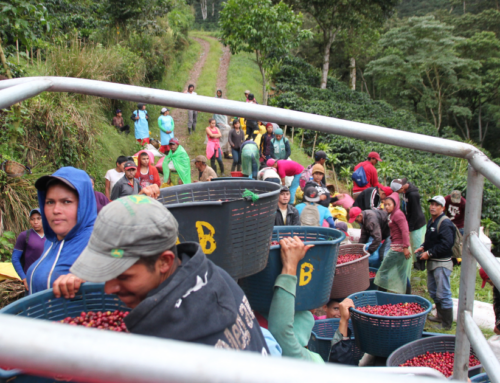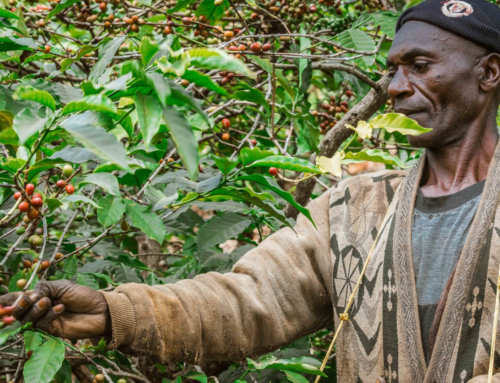Navigating Coffee Logistics in 2024: Insights from Juan Alvarez, Director of Logistics at Genuine Origin
As we dive into 2025, it’s worth reflecting on the logistical challenges that shaped the coffee supply chain in 2024. From infrastructure bottlenecks to weather disruptions, the coffee industry faced an array of obstacles. We sat down with Juan Alvarez, Director of Logistics at Genuine Origin, to explore these challenges and their impact on the coffee trade.
The Key Logistical Challenges of 2024

Disruptions from extreme weather. Credit – Sunrae from pixabay
Juan outlined several major hurdles that tested the resilience of the U.S. logistics network last year:
- Infrastructure Strain
Despite federal investment through the Infrastructure Investment and Jobs Act, outdated transportation networks continued to struggle with demand. Congestion at major ports like Los Angeles and New York slowed goods movement, while aging rail systems hindered the transportation of coffee and other commodities. - Extreme Weather Events
The U.S. experienced a wave of severe weather in 2024, from hurricanes in the Southeast to wildfires in the West and record snowstorms in the Midwest. These events caused significant delays and infrastructure damage. For instance, flooding along the Mississippi River disrupted freight transport for weeks, forcing costly rerouting. - Labor Shortages
The trucking industry faced a persistent driver shortage of over 70,000 positions, while warehousing and port operations struggled to attract workers. Despite investments in automation and robotics, critical roles still require human expertise, leaving gaps in the supply chain. - E-Commerce and Last-Mile Delivery Pressures
The growth of e-commerce continued to challenge last-mile delivery systems, with companies like Amazon and UPS grappling with heightened consumer expectations for fast delivery. Urban congestion further complicated operations, especially during peak shopping seasons. - “Black Swan” Events
Unexpected disruptions, such as the Baltimore bridge collapse and the ILA strike, tested supply chain adaptability. These events underscored the fragility of logistics networks when faced with sudden, high-impact challenges.

Port of Santa Marta in Colombia – artushfoto.eu from Artush
The Impact of Disruptions in Colombia and Brazil on Coffee Logistics
Colombia and Brazil, the world’s largest and third-largest coffee producers, faced their own set of challenges in 2024, causing ripple effects in global markets.
Adverse Weather Conditions
- Colombia: Intense rainfall from an unusually strong El Niño caused flooding and landslides in key coffee regions, delaying harvests and reducing bean quality.
- Brazil: Droughts and unexpected frost damaged crops during critical growth phases, leading to lower yields of both Arabica and Robusta beans.
Political and Economic Instability
- In Colombia, labor protests and port strikes delayed coffee exports, further complicating the supply chain.
- In Brazil, currency fluctuations and trade policy uncertainties contributed to price volatility and logistical bottlenecks.
Rising Costs and Delays
The combination of weather-related challenges and logistical issues increased transportation and storage costs, which were passed down the supply chain. Shipping delays from both countries disrupted the steady flow of green coffee beans to global markets.
2024 Trends That Flew Under the Radar
One overlooked issue in 2024 was the global shortage of 20-foot dry containers (20DC). This scarcity compounded other logistical challenges, adding delays and increasing costs for coffee shipments.

Longshoremen picketing at the ports – Photo from Freightwaves
Port Strikes and the Road Ahead
As of the writing of this post, the International Longshoremen’s Association (ILA) and the United States Maritime Alliance (USMX) have come to a tentative agreement. So, we may not have a strike in January 2025.
Scope of the Issue
- The ILA opposes automation, citing potential job losses and national security risks, while the USMX advocates for modernization to improve efficiency.
- East and Gulf Coast ports handle a significant portion of U.S. imports, and disruptions could lead to increased costs and cargo delays.
The Role of the Incoming Administration
President-elect Donald Trump’s support for the ILA’s stance against automation may have influenced the negotiations and broader logistics policies, potentially prioritizing job preservation over technological advancements.

GO Boxes set to ship out during the holiday season.
Holiday Season Recap
The 2024 holiday season highlighted the challenges of managing peak shipping volumes within a compressed delivery window. While carriers implemented strategies to handle increased demand, several factors complicated operations:
- Severe winter storms disrupted deliveries in critical regions.
- Persistent labor shortages forced reliance on temporary workers, impacting efficiency.
- Urban congestion and limited automation further strained last-mile delivery systems.
Looking Ahead
Reflecting on 2024, it’s clear that coffee logistics face mounting pressures from environmental, economic, and labor-related challenges. However, as Juan emphasizes, the industry’s resilience lies in its ability to adapt and innovate. By addressing these obstacles head-on, the coffee supply chain can navigate future challenges and continue delivering one of the world’s most beloved beverages.






